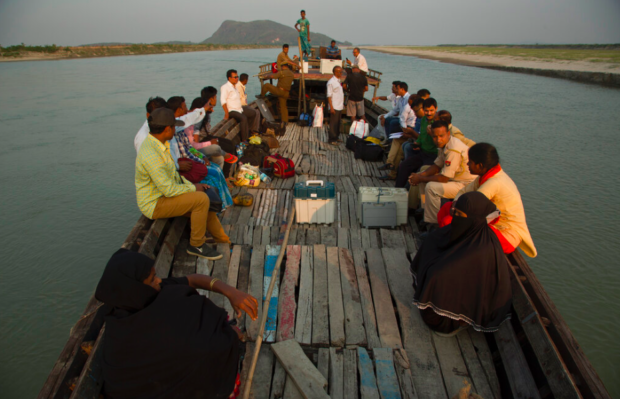Voting underway in 3rd phase of India’s national election

Indian election officials with polling materials travel on a country boat to reach a polling center in a remote river island in the River Brahmaputra in Kamrup district, west of Gauhati, Assam, India on April 22, 2019. AP
NEW DELHI — Indians were voting Tuesday in the third phase of the country’s general election, amid campaigning by Prime Minister Narendra Modi’s Hindu nationalist party and the opposition that has been marred by bitter accusations and acrimony.
People lined up outside voting stations at several places even before the polling started at 7 a.m.
The voting for 117 parliamentary seats in 13 states and two Union Territories on Tuesday means polls are half finished for 543 seats in the lower house of Parliament. The voting over seven phases ends May 19, with counting scheduled to begin May 23.
The election is seen as a referendum on Modi’s five-year rule. He has adopted a nationalist pitch trying to win the majority Hindu votes by projecting a tough stance against Islamic neighbor Pakistan.
The opposition is challenging him for a high unemployment rate of 6.1% and farmers’ distress aggravated by low crop prices.
Article continues after this advertisementModi voted in his western home state of Gujarat, though he is contesting for a parliamentary seat from Varanasi, a city in the northern state of Uttar Pradesh.
Article continues after this advertisementIn an apparent reference to the attacks in neighboring Sri Lanka on Sunday, Modi told reporters, “The weapon of terrorism is IED (improvised explosive device) and the strength of democracy is voter ID (identification card). I can say with surety that the voter ID is much more powerful than an IED.”
Campaigning in the multi-phase election ends 48 hours before voting in a particular area.
Tuesday’s voting is important for Modi’s Bharatiya Janata Party, which won more than half of 117 seats from these states in the 2014 elections that voted it to power. Its performance will have a bearing on its bid to retain power in New Delhi.
The voting also is taking place in Wayanad constituency in southern Kerala state, one of the two seats from where opposition Congress party president, Rahul Gandhi, is contesting. His home bastion, Amethi, in Uttar Pradesh state will vote on May 6. He will give up one seat if he wins from both places.
The voting is staggered to facilitate movement of security forces to oversee an orderly election and avoid vote fraud.
India’s autonomous Election Commission intervened last week to block hate speeches by imposing a temporary ban on campaigning by some top politicians across political parties.
Uttar Pradesh state’s chief minister, Yogi Adityanath of Modi’s BJP, was barred from campaigning, in the form of public meetings, road shows or media interviews, for three days for making anti-Muslim speeches. He said a Hindu god would ensure the BJP victory in elections, while the opposition was betting on Muslim votes.
Mayawati, a leader of the Bahujan Samaj Party who goes by one name, was punished for 48 hours for appealing to Muslims to vote only for her party. India’s top court ordered strict action against politicians for religion and caste-based remarks.
Hindus comprise 80% and Muslims 16% of India’s 1.3 billion people. The opposition accuses the BJP of trying to polarize the Hindu votes in its favor.
Meenakshi Lekhi, a BJP leader, filed a contempt of court petition against Rahul Gandhi in the Supreme Court for misrepresenting a court order while accusing Modi of corruption in a deal to buy 36 French Rafale fighter aircraft. Modi denies the charge.
Modi has used Kashmir to pivot away from his economic record, playing up the threat of rival Pakistan, especially after the suicide bombing of a paramilitary convoy on Feb. 14 that killed 40 soldiers, in a bid to appear a strong, uncompromising leader on national security. The bombing brought nuclear rivals India and Pakistan close to the brink of war.
Opposition parties have consistently said that Modi and his party leaders are digressing from the main issues such as youth employment and farmers’ suicides.
Kashmir is divided between India and Pakistan and both claim the Himalayan territory in its entirety. Rebels have been fighting Indian control since 1989. Most Kashmiris support the rebels’ demand that the territory be united either under Pakistani rule or as an independent country, while also participating in civilian street protests against Indian control. /ee